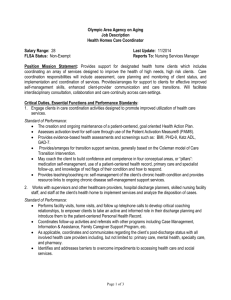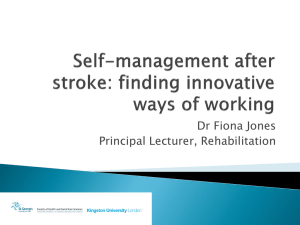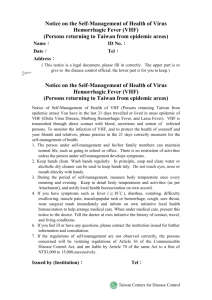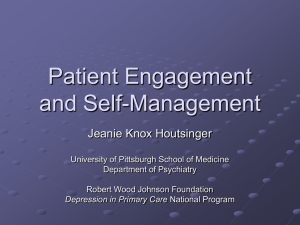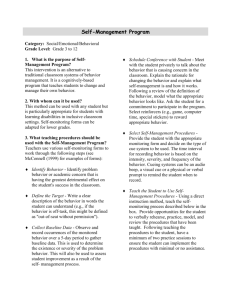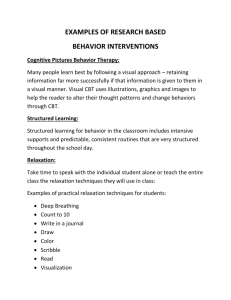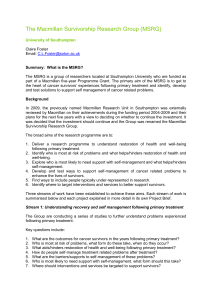Self-management Support for people with long
advertisement
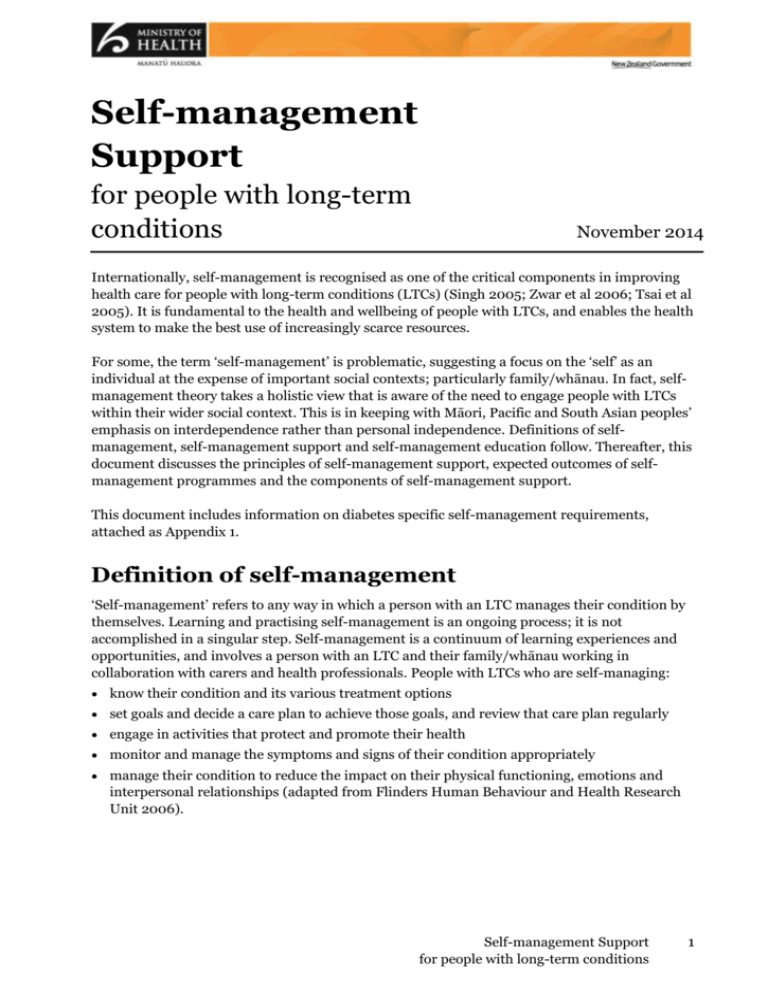
Self-management Support for people with long-term conditions November 2014 Internationally, self-management is recognised as one of the critical components in improving health care for people with long-term conditions (LTCs) (Singh 2005; Zwar et al 2006; Tsai et al 2005). It is fundamental to the health and wellbeing of people with LTCs, and enables the health system to make the best use of increasingly scarce resources. For some, the term ‘self-management’ is problematic, suggesting a focus on the ‘self’ as an individual at the expense of important social contexts; particularly family/whānau. In fact, selfmanagement theory takes a holistic view that is aware of the need to engage people with LTCs within their wider social context. This is in keeping with Māori, Pacific and South Asian peoples’ emphasis on interdependence rather than personal independence. Definitions of selfmanagement, self-management support and self-management education follow. Thereafter, this document discusses the principles of self-management support, expected outcomes of selfmanagement programmes and the components of self-management support. This document includes information on diabetes specific self-management requirements, attached as Appendix 1. Definition of self-management ‘Self-management’ refers to any way in which a person with an LTC manages their condition by themselves. Learning and practising self-management is an ongoing process; it is not accomplished in a singular step. Self-management is a continuum of learning experiences and opportunities, and involves a person with an LTC and their family/whānau working in collaboration with carers and health professionals. People with LTCs who are self-managing: know their condition and its various treatment options set goals and decide a care plan to achieve those goals, and review that care plan regularly engage in activities that protect and promote their health monitor and manage the symptoms and signs of their condition appropriately manage their condition to reduce the impact on their physical functioning, emotions and interpersonal relationships (adapted from Flinders Human Behaviour and Health Research Unit 2006). Self-management Support for people with long-term conditions 1 Definition of self-management support Self-management support’ refers to policies and people that may support the continuation of self-management behaviours across the lifespan, but that are not specific to educational processes (Canadian Diabetes Association Clinical Practice Guidelines Expert Committee 2013). Definition of self-management education ‘Self-management education’ (SME) is defined as a systematic intervention that teaches a person to actively participate in self-monitoring (of physiological processes) and/or decisionmaking (managing) relating to their condition/s. It recognises that patient-provider collaboration and the enablement of problem-solving skills are crucial to the individual’s ability for sustained self-care. Self-management education provides people with LTCs with the knowledge, skills and motivation to make decisions, and increases their capacity and confidence to apply these skills in daily life. Providers of SME must individualise the content and skill-training components of SME according to the types of LTC and recommended therapy, the individual patient’s ability, potential barriers to achievement, the patient’s motivation for learning and change, the patient’s culture, the patient’s literacy level, and available resources. Both self-management support and SME can be provided for individuals and their family/whānau or in a group setting. Principles of self-management support There is a wide range of self-management approaches; however, some overarching principles apply: a patient centred approach – self-management support programmes should empower people with LTCs to take a leading role in their care planning, (as they are able to) and support them to work in partnership with their health care professionals to set goals and action plans cultural relevance – programmes should be culturally sensitive and appropriate for diverse ethnic groups systematic follow up – primary care providers should undertake clinical assessment and follow-up care evaluation – providers should undertake both qualitative and formal quantitative evaluation of the programme. 2 Self-management Support for People with Long-term Conditions Cultural relevance for Māori Any self-management programme, and particularly group programmes, must be culturally appropriate. People with LTCs should have access to self-management support that is relevant to the ethnicity they identify with. A programme underpinned by kaupapa Māori approaches enriches the environment for effective learning by focusing on: tinorangitiratanga – self determination taonga tuku iho – cultural aspirations ako Māori – culturally preferred ways of learning whānau – the extended family members and their influence and support kaupapa – the collective philosophy of the members of the group (Smith and Reid 2000, pp 9–11). Expected outcomes of self-management programmes Self-management programmes should help people with LTCs to live longer, healthier, more independent lives. They should also achieve the following outcomes: people with LTCs work in partnership with their health care providers people with LTCs share information with their health providers and make informed decisions about their care health providers support people with LTCs to navigate information, services and resources. Components of self-management support As well as providing advice to individual people about managing their LTCs, programmes supporting patient self-management emphasise goal setting and problem solving skills. Such programmes reinforce the individual’s central role in managing their condition, with a key focus on health providers responding to people’s questions and needs. There are three essential components in self-management support programmes: health literacy behaviour change the role of the health professional in supporting self-management. These are discussed below. Health literacy Health literacy, from the patient perspective, is the cornerstone in enabling people to make informed choices and take care of their own health. A person with health literacy has the ability to obtain, process and understand basic health information and services, and can therefore make appropriate health decisions (Ministry of Health 2010). Self-management Support for People with Long-term Conditions 3 People with LTCs and individual health professionals on their own cannot address health literacy. Health care providers such as district health boards and primary health organisations play a critical role in supporting health professionals and people with LTC and their families/whānau to develop health literacy. Health literacy includes the ability to: understand and interpret health information provided in written, spoken and digital form understand instructions written on prescribed medicine containers and consent forms understand a health professional’s verbal advice and explanations navigate complex health systems communicate with health professionals, including by describing symptoms accurately and asking relevant questions find relevant information needed to make choices and decisions. Health professionals have a pivotal role in improving health literacy. Health professionals must tailor their style of communication to individual people with LTCs (and their family/whānau). Cultural competence and efforts to understand people’s health beliefs and preferences will improve the quality of health interactions, and consequently health literacy. Health behaviour change Health literacy education needs to be complemented by programmes to support people to change their health behaviour. There are five essential elements to changing health behaviour within self-management programmes: active involvement in problem solving, goal setting and written action plans lifestyle changes, including diet, physical activity and smoking cessation informed decision-making medication management stress management/positive mental health. Health professionals should recognise and address the potential barriers to health behaviour change, which will be different for each individual. The role of health professionals in self-management support Self-management requires health professionals to pose the following question, at every encounter: What can we do (as health providers and a health system) to support, enable and facilitate this person and their family and whānau to manage more effectively, safely and appropriately at home? A self-management approach requires behaviour change in health professionals as well as the person and their families and whānau. It requires a collaborative approach to care planning based on mutual respect and trust. A health professional can contribute to and support behaviour change by: supporting people with LTCs to set goals for themselves by providing information that helps them make informed decisions 4 Self-management Support for People with Long-term Conditions encouraging people to participate actively in their self-management by acknowledging that they are experts in their own lives supporting people with LTCs to attend supported self-management groups, where they available advocating for the creation of self-management support groups, where they are currently not available ensuring that self-management is culturally appropriate following up with people after their participation in self-management education programmes, to optimise and support their learning ensuring that initial self-management education is followed by regular updates and opportunistic learning as required. Primary health care providers – in particular general practice teams – play a particular role in ensuring that people with LTCs can access self-management support. However, to provide effective self-management support, nurses and general practitioners need to form part of a wider multidisciplinary team. The level of engagement each person with an LTC has with such a team will differ depending on the needs of that person. Multidisciplinary teams can be made up of general practitioners or primary health care nurses, Māori providers, Pacific providers, community pharmacists, community mental health workers, allied health professionals and medical specialists. References Canadian Diabetes Association Clinical Practice Guidelines Expert Committee. 2013. Clinical Practice Guidelines for the Prevention and Management of Diabetes in Canada. Canadian Journal of Diabetes 37(suppl 1): S1–S212. Flinders Human Behaviour and Health Research Unit. 2006. The Flinders Program™. URL: www.flinders.edu.au/medicine/sites/fhbhru/self-management.cfm (accessed 14 September 2014). Ministry of Health. 2010. Kōrero Mārama: Health Literacy and Māori. Wellington: Ministry of Health. Singh D. 2005 Transforming Chronic Care: Evidence for improving care for people with longterm conditions. Birmingham: Health Services Management Centre, The University of Birmingham. Smith LT, Reid P. 2000. Māori Research Development: Kaupapa Māori Principles and Practices: A literature review. Wellington: Te Puni Kōkiri. Tsai A, Morton S, Mangione C, et al. 2005. A meta-analysis of interventions to improve care for chronic illnesses. American Journal of Managed Care 11(8): 478–88. Self-management Support for People with Long-term Conditions 5 Zwar N, Harris M, Griffiths R, et al. 2006. A systematic review of chronic disease management. Sydney: Australian Primary Health Care Research Institute, School of Public Health and Community Medicine, University of New South Wales. Appendix 1: Diabetes-specific self-management support This document addresses self-management for LTCs in general; however, some aspects of selfmanagement are specific to diabetes. Additionally, different types of diabetes, including type 1, type 2 and gestational diabetes, are discreet conditions requiring different self-management skills across the lifespan. People with diabetes require specific information to make informed decisions on selfmanagement. This includes: information on living with diabetes, including: - managing high and low blood glucose levels - diet, including managing carbohydrate, fat and sugar intake - the importance of regular physical exercise and how to adjust insulin and carbohydrate accordingly - controlling diabetes before, during and after exercising knowledge of diabetes-specific medications, including: - information about individual medications for managing a person’s own diabetes - information about potential future medications - information on the risks of non-adherence to medicine schedules awareness of diabetes-specific complications and how to prevent them, including: - cardiovascular disease, and the need for regular monitoring and lifestyle advice to manage this risk - renal disease, and the need for regular monitoring to manage this risk - peripheral neuropathy, and the need to regularly undergo foot checks - retinopathy, and the need to regularly undergo retinal screening - depression, and the need for psychological support - sexual dysfunction information on clinical parameters, including: - blood glucose levels (HbA1c) - blood pressure - blood lipid levels (cholesterol) - microalbuminuria. Health providers should prioritise self-management support for the following groups: people newly diagnosed with type 2 diabetes people with diabetes failing to achieve clinical targets despite 6–12 months of trying people with diabetes with persisting clinical issues (eg, hypoglycaemia or weight gain) 6 Self-management Support for People with Long-term Conditions people with diabetes who are at high risk of complications. Dietary, exercise and lifestyle information can be suitable for inclusion in a programme created for people with prediabetes; however, diabetes-specific self-management support content is not appropriate for them. Published in November 2014 by the Ministry of Health, PO Box 5013, Wellington 6145. ISBN 978-0-478-42897-1 (online) HP 6017 Self-management Support for People with Long-term Conditions 7

